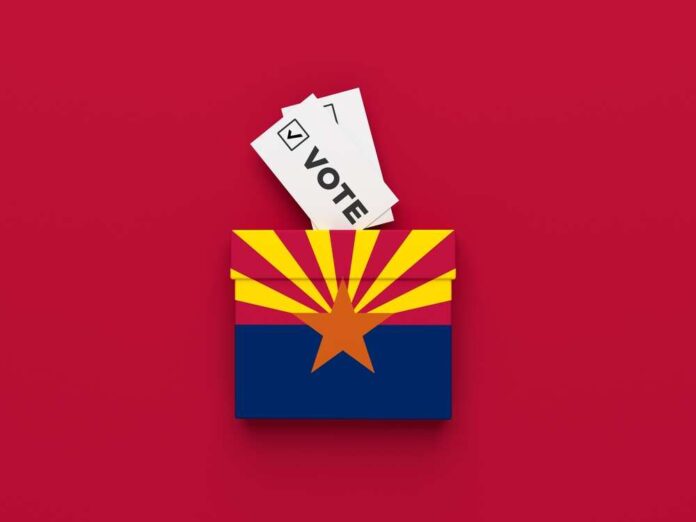
A conservative group launches a Spanish-language ad campaign warning noncitizens against voting in federal elections, sparking debate on election integrity and immigration.
At a Glance
- Trump-allied group funds $1 million Spanish-language ad campaign in battleground states
- Campaign warns noncitizens about illegality of voting in federal elections
- Republicans push for stricter voter registration laws, citing concerns about noncitizen voting
- Studies show noncitizen voting is extremely rare with no significant impact on elections
- Migrant communities in Arizona engage in grassroots activism to influence 2024 elections
Conservative Group Launches Ad Campaign on Noncitizen Voting
A conservative organization, the Article III Foundation, has initiated a Spanish-language advertising campaign in key battleground states, emphasizing the patriotic nature of voting while cautioning noncitizens against participating in federal elections. The $1 million campaign, spearheaded by Trump ally Mike Davis, targets states with significant Latino populations, including Arizona, Nevada, and Pennsylvania.
🚨BREAKING: Non-Citizens in AZ Admit Being Registered to VOTE🚨
Footage obtained by @realmuckraker shows that at one apartment complex in Phoenix, AZ, 6 non-citizens admitted to being registered to vote.
Non-citizens expressed support for Kamala Harris, and some plan to vote. pic.twitter.com/LTfbZhQ8ao
— Oversight Project (@OversightPR) September 26, 2024
The ads, set to air on Spanish-language television and radio channels, stress the illegality of noncitizen voting in federal elections. Mike Davis claims the campaign serves as a public service, informing viewers about voting laws while criticizing states for allegedly not enforcing them adequately.
Republican Push for Stricter Voter Registration Laws
In conjunction with this ad campaign, Republicans, led by former President Trump, are advocating for legislation that would require proof of citizenship for voter registration. This push is being tied to government funding bills, with House Speaker Mike Johnson linking federal spending authority to a proposal mandating citizenship proof for voter registration.
Some Republican-led states are taking matters into their own hands, proposing constitutional amendments to explicitly state that only citizens can vote. Various states are also implementing measures such as executive orders, lawsuits, and voter roll reviews to prevent noncitizen voting.
Debate Over Noncitizen Voting Impact
Despite the heightened focus on noncitizen voting, studies consistently show that it is an extremely rare occurrence with no significant impact on election outcomes. Noncitizen voting is illegal and leaves a detectable paper trail, and undocumented immigrants typically avoid interaction with government entities.
🚨Mexican Offers To Register Non-Citizens 🚨
Video obtained by @realmuckraker shows what has been called a "conspiracy theory," until now.
In Phoenix, Arizona a liberal, Mexican man in a grocery store offered to knowingly register a non-citizen DACA recipient to vote. pic.twitter.com/wxRZgYWg43
— Oversight Project (@OversightPR) October 7, 2024
The Biden administration and some Democrats argue that existing laws are sufficient to prevent noncitizen voting and oppose additional proof of citizenship requirements. They contend that such measures could potentially disenfranchise eligible voters.
Arizona’s Migrant Communities and the 2024 Elections
In Arizona, a state where the 2020 presidential election was decided by less than 11,000 votes, migrant communities are significantly impacted by the upcoming 2024 elections. Potential policies from a second Trump term, including mass deportations and the end of DACA, have mobilized these communities to engage in grassroots activism.
Organizations like the Arizona Dream Act Coalition, led by Karina Ruiz, are promoting civic engagement among Latinos and mixed-status families. While many in these communities cannot vote themselves, they are encouraging others to support candidates sympathetic to their cause.
Conclusion
As the 2024 election approaches, the debate over noncitizen voting and immigration policy continues to intensify. While conservative groups and Republican lawmakers push for stricter voting laws, citing concerns about election integrity, studies indicate that noncitizen voting is not a widespread issue. Meanwhile, migrant communities, particularly in battleground states like Arizona, are finding ways to make their voices heard in a political landscape that could significantly impact their futures.
Mexican Man in Phoenix Grocery Store Offers to Register DACA Aliens to Vote (VIDEO): “Video obtained by Real Muckraker shows what has been called a “conspiracy theory,” until now,” the Oversight Project said.
The post Mexican Man in Phoenix Grocery… https://t.co/T1ghBta0IC pic.twitter.com/SBbHe1yFxx
— Janie Johnson – America is Exceptional (@jjauthor) October 8, 2024














